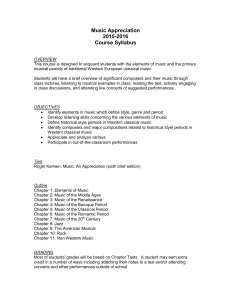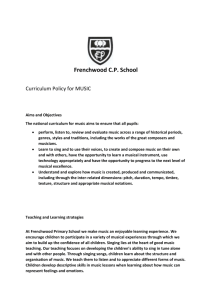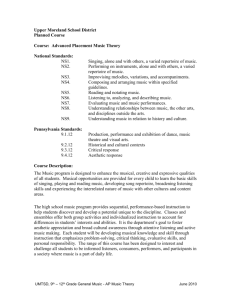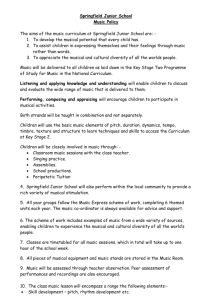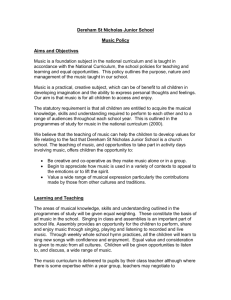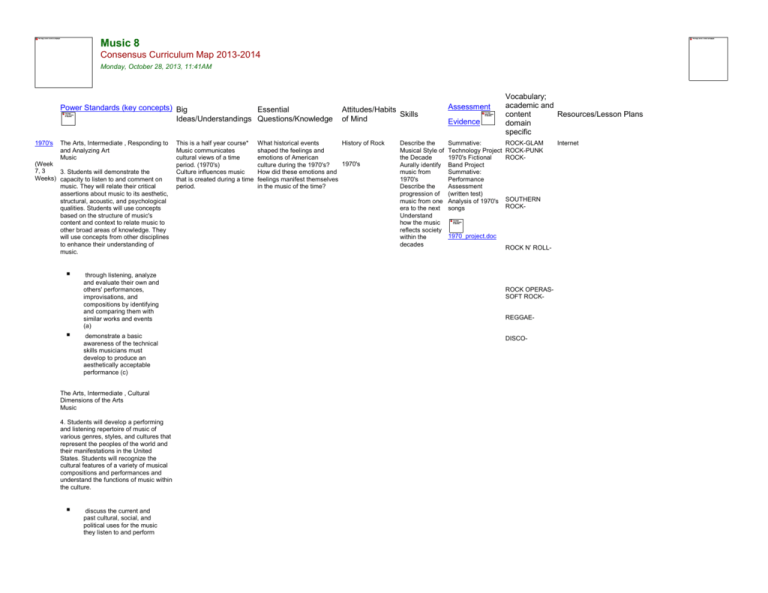
Music 8
Consensus Curriculum Map 2013-2014
Monday, October 28, 2013, 11:41AM
Power Standards (key concepts) Big
Essential
Ideas/Understandings Questions/Knowledge
1970's
The Arts, Intermediate , Responding to
and Analyzing Art
Music
(Week
7, 3
3. Students will demonstrate the
Weeks) capacity to listen to and comment on
music. They will relate their critical
assertions about music to its aesthetic,
structural, acoustic, and psychological
qualities. Students will use concepts
based on the structure of music's
content and context to relate music to
other broad areas of knowledge. They
will use concepts from other disciplines
to enhance their understanding of
music.
through listening, analyze
and evaluate their own and
others' performances,
improvisations, and
compositions by identifying
and comparing them with
similar works and events
(a)
demonstrate a basic
awareness of the technical
skills musicians must
develop to produce an
aesthetically acceptable
performance (c)
The Arts, Intermediate , Cultural
Dimensions of the Arts
Music
4. Students will develop a performing
and listening repertoire of music of
various genres, styles, and cultures that
represent the peoples of the world and
their manifestations in the United
States. Students will recognize the
cultural features of a variety of musical
compositions and performances and
understand the functions of music within
the culture.
discuss the current and
past cultural, social, and
political uses for the music
they listen to and perform
This is a half year course*
Music communicates
cultural views of a time
period. (1970's)
Culture influences music
that is created during a time
period.
Attitudes/Habits
Skills
of Mind
History of Rock
What historical events
shaped the feelings and
emotions of American
1970's
culture during the 1970's?
How did these emotions and
feelings manifest themselves
in the music of the time?
Describe the
Musical Style of
the Decade
Aurally identify
music from
1970's
Describe the
progression of
music from one
era to the next
Understand
how the music
reflects society
within the
decades
Assessment
Evidence
Summative:
Technology Project
1970's Fictional
Band Project
Summative:
Performance
Assessment
(written test)
Analysis of 1970's
songs
Vocabulary;
academic and
content
Resources/Lesson Plans
domain
specific
ROCK-GLAM
ROCK-PUNK
ROCK-
SOUTHERN
ROCK-
1970_project.doc
ROCK N’ ROLL-
ROCK OPERASSOFT ROCKREGGAEDISCO-
Internet
Power Standards (key concepts) Big
Essential
Ideas/Understandings Questions/Knowledge
Attitudes/Habits
Skills
of Mind
Assessment
Evidence
Vocabulary;
academic and
content
Resources/Lesson Plans
domain
specific
(c)
1950's
The Arts, Intermediate , Responding to
and Analyzing Art
Music
(Week
1, 3
3. Students will demonstrate the
Weeks) capacity to listen to and comment on
music. They will relate their critical
assertions about music to its aesthetic,
structural, acoustic, and psychological
qualities. Students will use concepts
based on the structure of music's
content and context to relate music to
other broad areas of knowledge. They
will use concepts from other disciplines
to enhance their understanding of
music.
through listening, analyze
and evaluate their own and
others' performances,
improvisations, and
compositions by identifying
and comparing them with
similar works and events
(a)
use appropriate terms to
reflect a working knowledge
of the musical elements (b)
use appropriate terms to
reflect a working knowledge
of social-musical functions
and uses (appropriate
choices of music for
common ceremonies and
other events) (d)
use terminology from
music and other arts to
analyze and compare the
structures of musical and
other artistic and literary
works (f).
The Arts, Intermediate , Cultural
Dimensions of the Arts
Music
4. Students will develop a performing
and listening repertoire of music of
various genres, styles, and cultures that
represent the peoples of the world and
their manifestations in the United
States. Students will recognize the
cultural features of a variety of musical
compositions and performances and
understand the functions of music within
the culture.
This is a half Year course*
Music communicates
cultural views of a time
period. (1950's)
Culture influences music
that is created during a time
period.
What historical events
History of Rock n
shaped the feelings and
Roll
1950's
emotions of American
culture during the 1950's?
How did these emotions and
feelings manifest themselves
in the music of the time?
How did music in this
decade change in regards to
racial equality?
Describe the
Musical Style of
the Decade
Aurally identify
music from the
decade
Describe the
progression of
music from one
era to the next
Understand
how the music
reflects society
within the
decades
Identify the
significance of
music within the
decade
Other written
assessments
-musical
analyzations
-written quizzes
determining
information about
the 1950's and its
music
culture
chord
progression
backbeat
lyrics
50_s_quiz.doc
1950's rock
project.doc
1950's rock
project.doc
form
genre
Elvis
Buddy Holly
Emulate a given
role from the
50's ( parent,
teenager, music
artist, dj,) to
emote correct
perceptions,
attitudes, and
behaviors of the
period
Big Bopper
Richie Valens
Jerry Lee Lewis
Chuck Berry
Alan Freed
Payola
Sam Phillips
segregation
integration
Martin Luther
King Jr.
1950's video
cd's of musical examples
internet - www.rockhall.com
Power Standards (key concepts) Big
Essential
Ideas/Understandings Questions/Knowledge
identify the cultural
contexts of a performance
or recording and perform
(with movement, where
culturally appropriate) a
varied repertoire of folk, art,
and contemporary
selections from the basic
cultures that represent the
peoples of the world (a)
identify from a
performance or recording
the titles and composers of
well-known examples of
classical concert music and
blues/ jazz selections (b)
discuss the current and
past cultural, social, and
political uses for the music
they listen to and perform
(c)
NSAE: Arts, NSAE: Grades 5-8 , Music
Content Standard #6: Listening to,
analyzing, and describing music
Students analyze the uses
of elements of music in
aural examples
representing diverse genres
and cultures
Content Standard #7: Evaluating music
and music performances
Students develop criteria
for evaluating the quality
and effectiveness of music
performances and
compositions and apply the
criteria in their personal
listening and performing
Students evaluate the
quality and effectiveness of
their own and others'
performances,
compositions,
arrangements, and
improvisations by applying
specific criteria appropriate
for the style of the music
and offer constructive
suggestions for
improvement
Content Standard #8: Understanding
Attitudes/Habits
Skills
of Mind
Assessment
Evidence
Vocabulary;
academic and
content
Resources/Lesson Plans
domain
specific
Power Standards (key concepts) Big
Essential
Ideas/Understandings Questions/Knowledge
Attitudes/Habits
Skills
of Mind
Assessment
Evidence
Vocabulary;
academic and
content
Resources/Lesson Plans
domain
specific
relationships between music, the other
arts, and disciplines outside the arts
Students describe ways in
which the principles and
subject matter of other
disciplines taught in the
school are interrelated with
those of music (e.g.,
language arts: issues to be
considered in setting texts
to music; mathematics:
frequency ratios of
intervals; sciences: the
human hearing process and
hazards to hearing; social
studies: historical and
social events and
movements chronicled in or
influenced by musical
works)
Content Standard #9: Understanding
music in relation to history and culture
1960's
Students compare, in
several cultures of the
world, functions music
serves, roles of musicians
(e.g., lead guitarist in a rock
band, composer of jingles
for commercials, singer in
Peking opera), and
conditions under which
music is typically performed
The Arts, Intermediate , Responding to
and Analyzing Art
Music
(Week
4, 3
3. Students will demonstrate the
Weeks) capacity to listen to and comment on
music. They will relate their critical
assertions about music to its aesthetic,
structural, acoustic, and psychological
qualities. Students will use concepts
based on the structure of music's
content and context to relate music to
other broad areas of knowledge. They
will use concepts from other disciplines
to enhance their understanding of
music.
through listening, analyze
and evaluate their own and
others' performances,
improvisations, and
compositions by identifying
This is a half year course*
Music communicates
cultural views of a time
period. (1960's)
Culture influences music
that is created during a time
period.
What historical events
History of Rock
1960's
shaped the feelings and
emotions of American
culture during the 1960's?
How did these emotions and
feelings manifest themselves
in the music of the time?
How did music in this
decade change in regards to
racial equality?
Describe the
Musical Style of
the Decade
Aurally identify
music from
1960's
Describe the
progression of
music from one
era to the next
Understand
how the music
reflects society
within the
decades
What is the
significance of
music within the
decade
Other written
assessments
- musical
analyzations
- written quiz
evaluating ideas
and musical style
of 1960's
Formative:
Introduce Skills
protest song
1960's video
internet - www.rockhall.com www.songfacts.com
cd examples of 1960's music
civil rights
segregation
http://www.readwritethink.org/lessons/lesson_view.asp?id=979
integration
Bob Dylan
Byrds
Beatles
Rolling Stones
Kent State
Power Standards (key concepts) Big
Essential
Ideas/Understandings Questions/Knowledge
and comparing them with
similar works and events
(a)
use appropriate terms to
reflect a working knowledge
of the musical elements (b)
use appropriate terms to
reflect a working knowledge
of social-musical functions
and uses (appropriate
choices of music for
common ceremonies and
other events) (d)
use terminology from
music and other arts to
analyze and compare the
structures of musical and
other artistic and literary
works (f).
The Arts, Intermediate , Cultural
Dimensions of the Arts
Music
4. Students will develop a performing
and listening repertoire of music of
various genres, styles, and cultures that
represent the peoples of the world and
their manifestations in the United
States. Students will recognize the
cultural features of a variety of musical
compositions and performances and
understand the functions of music within
the culture.
identify the cultural
contexts of a performance
or recording and perform
(with movement, where
culturally appropriate) a
varied repertoire of folk, art,
and contemporary
selections from the basic
cultures that represent the
peoples of the world (a)
identify from a
performance or recording
the titles and composers of
well-known examples of
classical concert music and
blues/ jazz selections (b)
discuss the current and
past cultural, social, and
political uses for the music
they listen to and perform
(c)
Attitudes/Habits
Skills
of Mind
Assessment
Evidence
Vocabulary;
academic and
content
Resources/Lesson Plans
domain
specific
protest
acoustic vs.
electrified music
Janis Joplin
Jimi Hendrix
Vietnam war
folk music
1980's
Power Standards (key concepts) Big
Essential
Ideas/Understandings Questions/Knowledge
Attitudes/Habits
Skills
of Mind
Assessment
The Arts, Intermediate , Responding to
and Analyzing Art
Music
80's rock genres
Analysis of 1980's
music
Formative:
Performance
Assessment
(written test)
(Week
10, 3
3. Students will demonstrate the
Weeks) capacity to listen to and comment on
music. They will relate their critical
assertions about music to its aesthetic,
structural, acoustic, and psychological
qualities. Students will use concepts
based on the structure of music's
content and context to relate music to
other broad areas of knowledge. They
will use concepts from other disciplines
to enhance their understanding of
music.
Music communicates
cultural views of a time
period. (1980's)
Culture influences music
that is created during a time
period.
How did technological
advances change popular
music?
What was the stance of the
music industry in regards to
racial equality?
Music is a means of
entertainment.
Was there a change in this
stance throughout the 80's?
If so, who or what facilitated
this change?
Describe the
Musical Style of
the Decade
Aurally identify
music from
1980's
Describe the
progression of
music from one
era to the next
Understand
how the music
reflects society
within the
decades
Evidence
Vocabulary;
academic and
content
Resources/Lesson Plans
domain
specific
MTV
80's overview
technology
80's musical examples
icon
80's video examples
videos
smartboard
Rock
Hairbands
Rap
through listening, analyze
and evaluate their own and
others' performances,
improvisations, and
compositions by identifying
and comparing them with
similar works and events
(a)
Hip-hop
New wave
Thrash metal
demonstrate a basic
awareness of the technical
skills musicians must
develop to produce an
aesthetically acceptable
performance (c)
Pop
use appropriate terms to
reflect a working knowledge
of social-musical functions
and uses (appropriate
choices of music for
common ceremonies and
other events) (d)
Arena BandsReo
Speedwagon,
Journey
use terminology from
music and other arts to
analyze and compare the
structures of musical and
other artistic and literary
works (f).
The Arts, Intermediate , Cultural
Dimensions of the Arts
Music
4. Students will develop a performing
and listening repertoire of music of
various genres, styles, and cultures that
represent the peoples of the world and
their manifestations in the United
States. Students will recognize the
cultural features of a variety of musical
compositions and performances and
understand the functions of music within
the culture.
vinyl
racial equality
Power Standards (key concepts) Big
Essential
Ideas/Understandings Questions/Knowledge
1990's
1990's genres
Analysis of 1990's
music
Formative:
Performance
Assessment
(written test)
Evidence
Vocabulary;
academic and
content
Resources/Lesson Plans
domain
specific
discuss the current and
past cultural, social, and
political uses for the music
they listen to and perform
(c)
(Week
13, 3
3. Students will demonstrate the
Weeks) capacity to listen to and comment on
music. They will relate their critical
assertions about music to its aesthetic,
structural, acoustic, and psychological
qualities. Students will use concepts
based on the structure of music's
content and context to relate music to
other broad areas of knowledge. They
will use concepts from other disciplines
to enhance their understanding of
music.
Assessment
identify the cultural
contexts of a performance
or recording and perform
(with movement, where
culturally appropriate) a
varied repertoire of folk, art,
and contemporary
selections from the basic
cultures that represent the
peoples of the world (a)
The Arts, Intermediate , Responding to
and Analyzing Art
Music
Attitudes/Habits
Skills
of Mind
Music communicates
cultural views of a time
period. (1990's)
Culture influences music
that is created during a time
period.
Music is a means of
entertainment.
Why was there an antiestablishment attitude
present in the music and
culture of the 90's?
Describe the
Musical Style of
the Decade
Aurally identify
music from
1990's
Describe the
progression of
music from one
era to the next
Understand
how the music
reflects society
within the
decade
Alternative rock
90's powerpoint
iconoclastic
smartboard
Grunge
90's overview sheet
Post Grunge
90's music examples
Heavy Metal
Alternative Metal
Pop Punk
through listening, analyze
and evaluate their own and
others' performances,
improvisations, and
compositions by identifying
and comparing them with
similar works and events
(a)
use appropriate terms to
reflect a working knowledge
of the musical elements (b)
demonstrate a basic
awareness of the technical
skills musicians must
develop to produce an
aesthetically acceptable
performance (c)
use terminology from
music and other arts to
analyze and compare the
structures of musical and
other artistic and literary
Third Wave Ska
Nu Metal
Funk
Hip Hop
riffs
distortion
singer songwriter
Pop Rap
Power Standards (key concepts) Big
Essential
Ideas/Understandings Questions/Knowledge
Attitudes/Habits
Skills
of Mind
works (f).
Assessment
Evidence
Vocabulary;
academic and
content
Resources/Lesson Plans
domain
specific
socio-political
afro-centric
The Arts, Intermediate , Cultural
Dimensions of the Arts
Music
Gangsta Rap
4. Students will develop a performing
and listening repertoire of music of
various genres, styles, and cultures that
represent the peoples of the world and
their manifestations in the United
States. Students will recognize the
cultural features of a variety of musical
compositions and performances and
understand the functions of music within
the culture.
Teen
Pop/Bubblegum
Pop
identify the cultural
contexts of a performance
or recording and perform
(with movement, where
culturally appropriate) a
varied repertoire of folk, art,
and contemporary
selections from the basic
cultures that represent the
peoples of the world (a)
identify from a
performance or recording
the titles and composers of
well-known examples of
classical concert music and
blues/ jazz selections (b)
discuss the current and
past cultural, social, and
political uses for the music
they listen to and perform
(c)
music The Arts, Intermediate , Responding to
of today and Analyzing Art
Music
(Week 3. Students will demonstrate the
16, 5
capacity to listen to and comment on
Weeks) music. They will relate their critical
assertions about music to its aesthetic,
structural, acoustic, and psychological
qualities. Students will use concepts
based on the structure of music's
content and context to relate music to
other broad areas of knowledge. They
will use concepts from other disciplines
to enhance their understanding of
music.
East Coast Rap
through listening, analyze
and evaluate their own and
Music communicates
cultural views of a time
period. (2000)
Culture influences music
that is created during a time
period.
Music is a means of
entertainment.
How do previous music
genres influence music to
come?
Why do people choose to
listen to the music they listen
to?
current music
genres
Describe the
Musical Styles
of the Decade
Aurally identify
music
from today
Predict the
possible
progression
music will take
from here on.
Understand
how the music
reflects society
of today
genre
Anlysis of music
2000-2009
Formative:
Performance
Assessment
(written test)
Prediction Project
Technology Project
Students make
predictions as to
what types of
music will be
popular in the next
decade
internet
computer access
smartboard
Power Standards (key concepts) Big
Essential
Ideas/Understandings Questions/Knowledge
others' performances,
improvisations, and
compositions by identifying
and comparing them with
similar works and events
(a)
use appropriate terms to
reflect a working knowledge
of the musical elements (b)
demonstrate a basic
awareness of the technical
skills musicians must
develop to produce an
aesthetically acceptable
performance (c)
use appropriate terms to
reflect a working knowledge
of social-musical functions
and uses (appropriate
choices of music for
common ceremonies and
other events) (d)
The Arts, Intermediate , Cultural
Dimensions of the Arts
Music
4. Students will develop a performing
and listening repertoire of music of
various genres, styles, and cultures that
represent the peoples of the world and
their manifestations in the United
States. Students will recognize the
cultural features of a variety of musical
compositions and performances and
understand the functions of music within
the culture.
identify the cultural
contexts of a performance
or recording and perform
(with movement, where
culturally appropriate) a
varied repertoire of folk, art,
and contemporary
selections from the basic
cultures that represent the
peoples of the world (a)
identify from a
performance or recording
the titles and composers of
well-known examples of
classical concert music and
blues/ jazz selections (b)
discuss the current and
past cultural, social, and
political uses for the music
they listen to and perform
(c)
Attitudes/Habits
Skills
of Mind
Assessment
Evidence
Vocabulary;
academic and
content
Resources/Lesson Plans
domain
specific
Power Standards (key concepts) Big
Essential
Ideas/Understandings Questions/Knowledge
Attitudes/Habits
Skills
of Mind
Assessment
Evidence
Vocabulary;
academic and
content
Resources/Lesson Plans
domain
specific
Last Updated: Monday, November 21, 2011, 12:52PM
Atlas Version 8.0.1
© Rubicon International 2013. All rights reserved


